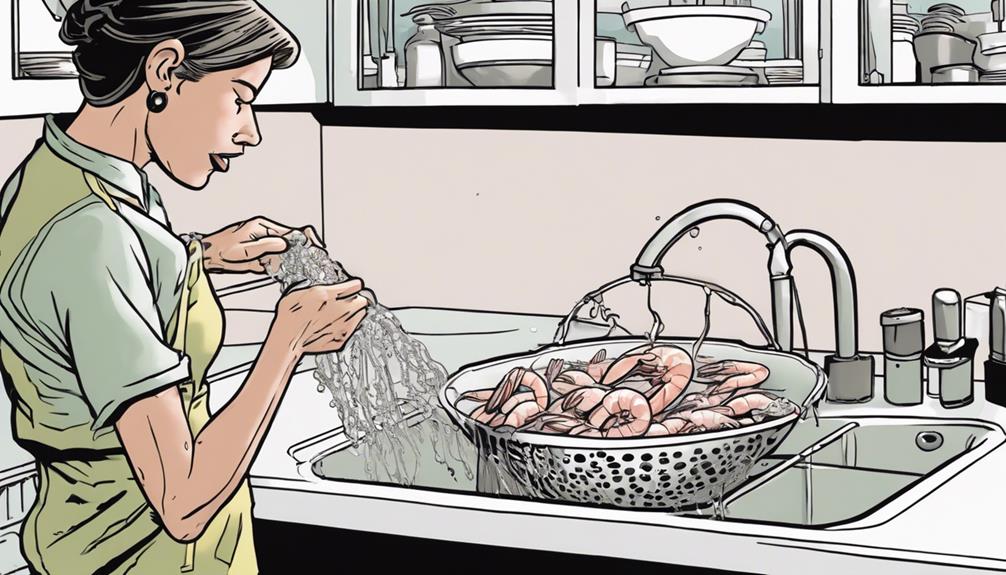When prepping raw shrimp, avoid rinsing to lock in flavor and safety, despite popular belief. Rinsing can dilute taste and up the risk of bacteria transfer. Stick around to uncover all the hidden shrimp prep gems!
Main Points
- Rinsing raw shrimp before cooking is optional.
- Cooking shrimp thoroughly is more crucial for safety.
- Rinsing can dilute flavor but enhance cleanliness.
- Proper storage and handling are vital for freshness.
- Experiment with rinsing methods based on personal preference.
Safety Concerns When Handling Raw Shrimp
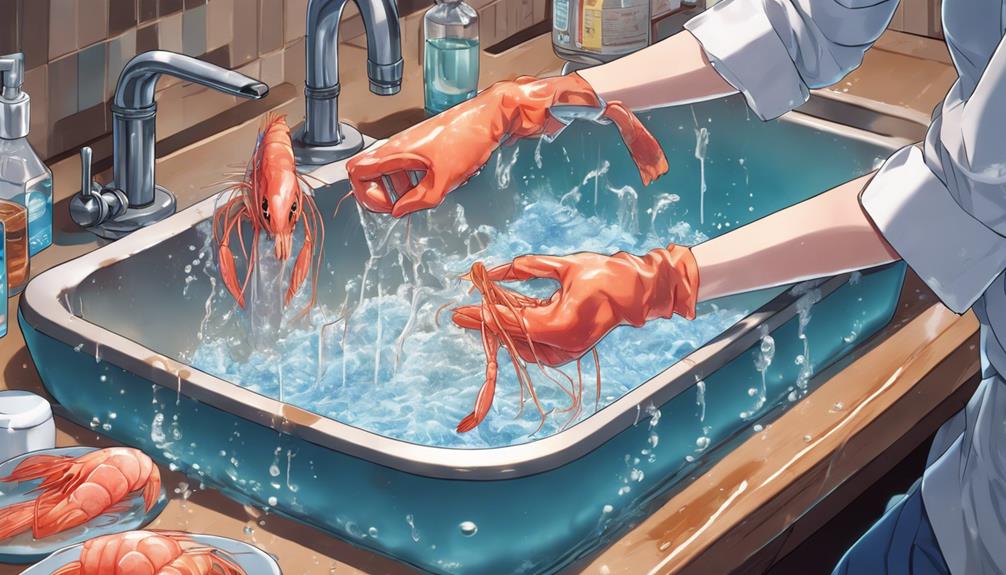
When preparing raw shrimp, prioritize caution to minimize the risk of contamination and guarantee a safe cooking experience. Raw shrimp can harbor harmful bacteria like Vibrio, which can cause food poisoning if not handled properly. To ensure safety, always wash your hands before and after handling raw shrimp, as well as any utensils or surfaces that come into contact with the seafood.
It's essential to keep raw shrimp separate from ready-to-eat foods to prevent cross-contamination. Use different cutting boards and utensils for raw shrimp to avoid spreading bacteria to other ingredients. Additionally, store raw shrimp in the coldest part of the refrigerator and cook it within two days of purchase to maintain freshness and reduce the risk of bacterial growth.
Impact on Shrimp Flavor Profile
Curious how exploring raw shrimp before cooking impacts their flavor profile? Many chefs have debated this topic, so let's delve in and explore how rinsing can affect the taste of your shrimp:
- Dilution of Flavor: Rinsing shrimp can potentially wash away some of its natural flavors, leading to a milder taste.
- Removal of Surface Impurities: Rinsing can help remove any surface impurities or residues, contributing to a cleaner flavor profile.
- Potential Loss of Salinity: Rinsing might wash off some saltiness from the shrimp, impacting its overall taste.
- Enhanced Seasoning Absorption: On the flip side, rinsing could help shrimp absorb seasoning more effectively, intensifying its flavor.
- Minimized Fishy Aftertaste: Some argue that rinsing can reduce the fishy aftertaste in shrimp, making it more palatable to sensitive taste buds.
Ultimately, the impact of rinsing raw shrimp on its flavor profile can vary depending on personal preference and cooking techniques. Feel free to experiment and see what works best for your palate!
Potential Texture Changes After Rinsing
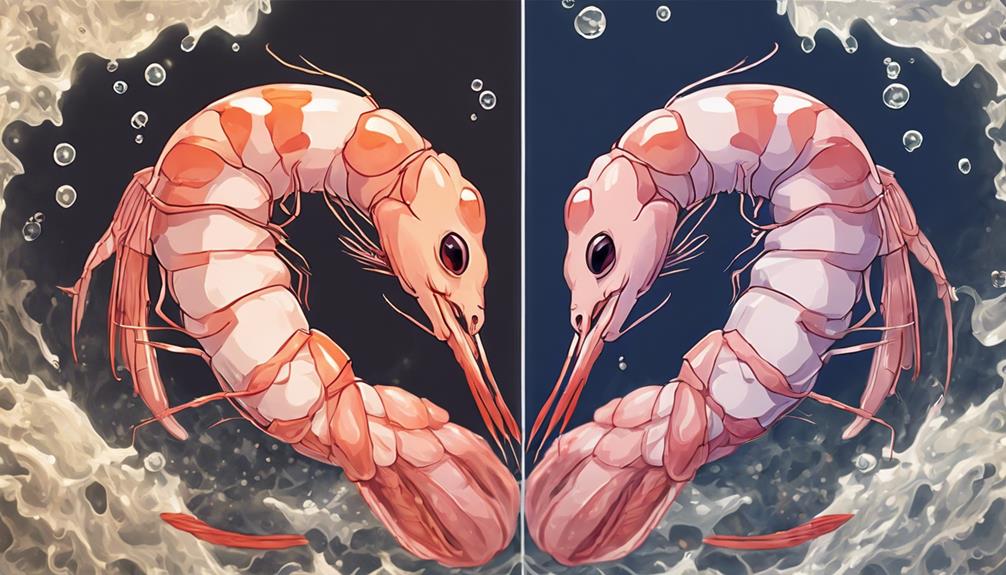
Considering whether rinsing raw shrimp before cooking affects their texture? Some argue that rinsing shrimp can lead to a loss of flavor and texture. When you rinse shrimp, you may inadvertently wash away some of the natural juices and flavor. However, the impact on texture is subjective and might depend on personal preference. Some prefer the slightly firmer texture that rinsing can provide, while others enjoy the natural tenderness of unrinsed shrimp. To help you decide, let's take a closer look at the potential texture changes that could occur:
| Potential Texture Changes | Description |
|---|---|
| Firmer Texture | Rinsing can make shrimp slightly firmer, which some find appealing. |
| Loss of Natural Juices | Washing shrimp may lead to a loss of natural juices, affecting tenderness. |
| Subjective Preference | Texture changes post-rinsing can vary based on personal taste. |
| Cooking Method Impact | The impact of rinsing on texture may differ depending on the cooking method. |
Exploring these factors can help you make an informed decision on whether to rinse your raw shrimp before cooking.
Tips for Properly Rinsing Raw Shrimp
To guarantee your raw shrimp is properly rinsed, follow these practical tips for maximizing flavor and texture:
- Use Cold Water: Rinse your shrimp under cold running water to remove any dirt or debris without cooking the shrimp.
- Gently Pat Dry: After rinsing, gently pat the shrimp dry with a paper towel to remove excess water, ensuring a better sear or cook.
- Avoid Prolonged Soaking: Don't soak the shrimp for an extended period as this can lead to a loss of flavor and texture.
- Remove Shells After Rinsing: If you prefer to cook shrimp without the shells, it's easier to remove them after rinsing.
- Inspect for Remaining Veins: Check for any remaining veins after rinsing the shrimp to make sure they're completely cleaned before cooking.
Alternative Methods for Cleaning Shrimp
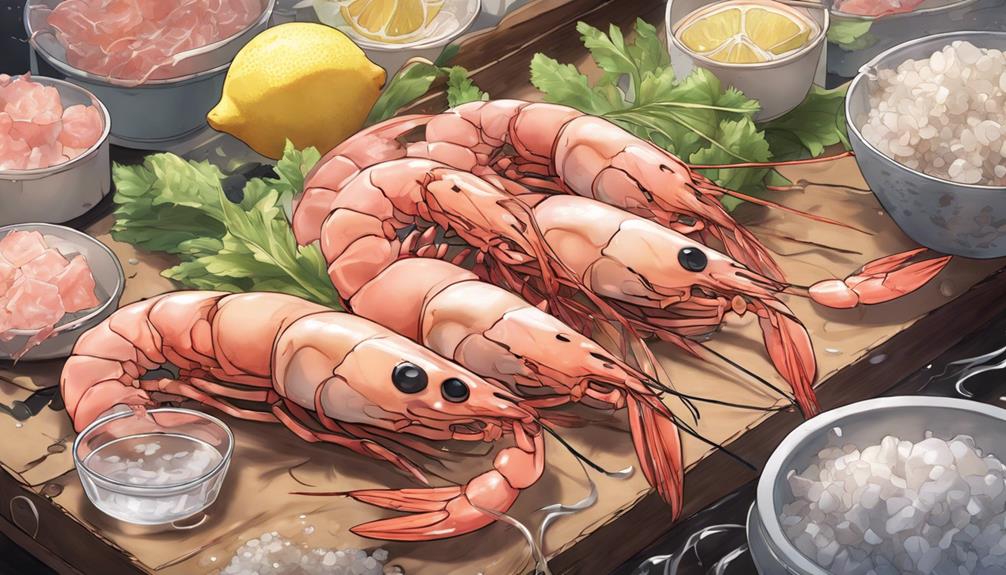
Looking for new ways to clean shrimp without compromising flavor and texture? There are alternative methods for cleaning shrimp that can help you prepare this delicious seafood without the need for rinsing. Check out the table below for some innovative ideas:
| Method | Description |
|---|---|
| Salt Water Soak | Submerge shrimp in a bowl of salt water for 10-15 minutes to draw out impurities. Rinse briefly before cooking. |
| Lemon Juice Bath | Marinate shrimp in lemon juice for 5-10 minutes to neutralize odors and flavors. Rinse lightly to remove excess acidity. |
| Baking Soda Scrub | Gently massage shrimp with a mixture of baking soda and water to clean and brighten the shells. Rinse thoroughly before cooking. |
| Vinegar Solution Rinse | Dip shrimp in a solution of water and vinegar for a quick clean. Rinse with fresh water to remove any residual taste. |
These methods offer effective ways to clean shrimp while preserving their natural taste and quality. Experiment with these alternatives to find the technique that works best for you!
Health Considerations of Rinsing Shrimp
Curious about how rinsing raw shrimp before cooking can impact your health? While rinsing shrimp can help remove potential contaminants, there are some health considerations to keep in mind.
- Cross-Contamination: Rinsing shrimp could potentially spread harmful bacteria to other surfaces or foods in your kitchen.
- Loss of Nutrients: Washing shrimp may lead to a loss of water-soluble nutrients like Vitamin B and minerals.
- Potential Chemicals: Shrimp may have been treated with chemicals to preserve freshness, and rinsing could remove some of these chemicals.
- Risk of Splatter: Water splattering during rinsing could lead to accidental ingestion of bacteria present on the shrimp.
- Cooking Adequately: Ultimately, cooking shrimp thoroughly to the right temperature is more essential for food safety than rinsing.
Expert Opinions on Rinsing Raw Shrimp
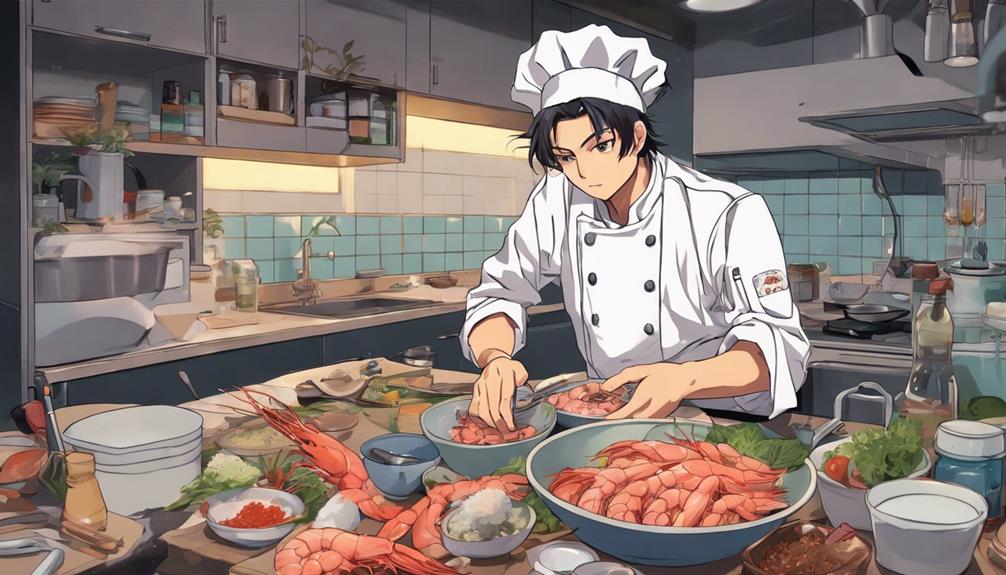
Expert chefs worldwide offer varying perspectives on the necessity of rinsing raw shrimp before cooking, shedding light on the essential debate surrounding this culinary practice. Some argue that rinsing shrimp is vital to remove any lingering dirt or bacteria that could affect the taste and safety of the dish. These chefs recommend a quick rinse under cold water, ensuring the shrimp are clean before they hit the heat. On the other hand, others believe rinsing shrimp is an unnecessary step, asserting that proper cooking temperatures will eliminate any harmful bacteria while preserving the shrimp’s natural flavor. Regardless of the stance on rinsing, many culinary experts emphasize the importance of always ensuring you thaw frozen shrimp before cooking to achieve even heat distribution and optimal texture. By addressing both cleanliness and preparation, chefs can create dishes that are both safe and flavorful.
On the other hand, there are chefs who believe that rinsing shrimp can wash away flavor and natural juices that contribute to the overall taste of the dish. They suggest that patting the shrimp dry with paper towels is sufficient to remove excess moisture without compromising flavor.
Ultimately, the decision to rinse raw shrimp before cooking comes down to personal preference and the specific recipe being prepared. Experimenting with both methods can help you determine what works best for your palate and cooking style. So, whether you choose to rinse or not to rinse, remember that the most important thing is to cook your shrimp to perfection.
Common Misconceptions About Rinsing Shrimp
There are several common misconceptions about rinsing shrimp that may influence how you approach preparing this seafood delicacy. Here are some myths debunked:
- Myth 1: Rinsing shrimp removes the briny flavor – The natural taste of shrimp comes from its inherent sweetness, not the saltwater it's stored in.
- Myth 2: Rinsing shrimp eliminates bacteria – Cooking shrimp thoroughly is what kills any harmful bacteria, not a quick rinse.
- Myth 3: Rinsing shrimp makes it less slimy – The sliminess of shrimp is due to a natural protein, not a lack of rinsing.
- Myth 4: Rinsing shrimp makes it cleaner – Shrimp processors usually clean and devein shrimp before packaging, so rinsing is more about removing any residual dirt or particles.
- Myth 5: Rinsing shrimp is necessary to remove the 'fishy' smell – Fresh shrimp shouldn't have a strong fishy odor; if it does, it's likely not fresh.
Best Practices for Cooking Raw Shrimp
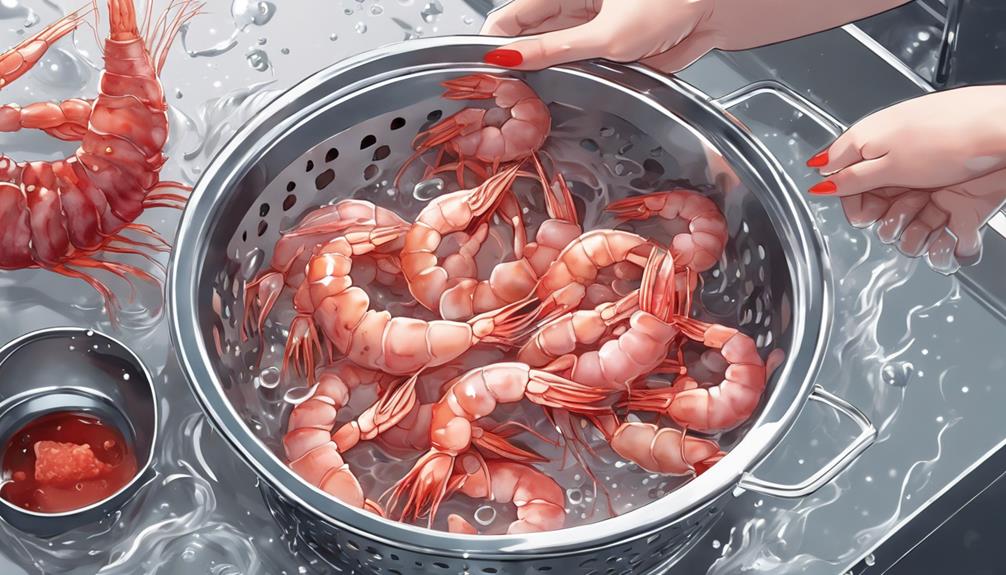
Don't let misconceptions cloud your approach to cooking raw shrimp; instead, focus on mastering the best practices for bringing out the perfect flavor and texture in this seafood delicacy. When cooking raw shrimp, follow these tips to guarantee a delicious outcome:
| Best Practice | Description | Why It Works |
|---|---|---|
| Quick Marinades | Marinate shrimp for 15-30 minutes in a mixture of olive oil, garlic, and herbs for enhanced flavor. | Allows flavors to infuse without compromising shrimp texture. |
| Proper Seasoning | Season shrimp generously with salt and pepper before cooking to bring out the natural sweetness of the shrimp. | Enhances the overall taste profile of the dish. |
| Avoid Overcooking | Cook shrimp just until they turn pink and opaque, usually 2-3 minutes per side, to prevent rubbery texture. | Maintains the shrimp's tenderness and juiciness. |
| Fresh Ingredients | Use fresh shrimp whenever possible for the best taste and texture. | Ensures a sweet, briny flavor and firm, succulent texture. |
Conclusion
So, should you rinse raw shrimp before cooking it?
The answer is, it depends. While rinsing can help remove any lingering debris or bacteria, it may also impact the flavor and texture of the shrimp.
However, with proper rinsing techniques and consideration of personal preferences, you can still enjoy delicious shrimp dishes.
And remember, if you're worried about losing flavor, try marinating the shrimp instead for a burst of delicious taste!
